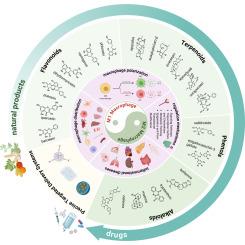天然产物通过调节巨噬细胞极化抑制炎性疾病。
IF 4.7
2区 医学
Q2 IMMUNOLOGY
引用次数: 0
摘要
巨噬细胞表现出相当大的适应性。巨噬细胞作为人类先天免疫系统的重要组成部分,通过分化成不同的表型,可以发挥不同的功能。巨噬细胞经历不断变化的转化,分为M1(火热型)或M2(平静型)表型,后者驱动炎症性疾病的进展。鉴于巨噬细胞在炎症中的关键作用,调节巨噬细胞极化可能成为几种炎症性疾病的潜在治疗靶点。天然产物,包括黄酮类、萜类、酚类和生物碱,已经证明了控制巨噬细胞方向和抑制炎症性疾病的显着能力。这是通过结合NF-κB、JAK/STAT和MAPK通路等关键信号通路实现的。本文综述了巨噬细胞极化的机制,强调了天然物质的治疗潜力,为炎性疾病的预防和治疗管理提供了有价值的见解。本文章由计算机程序翻译,如有差异,请以英文原文为准。

Natural products inhibit inflammatory diseases by regulating macrophage polarization
Macrophages exhibit considerable adaptability. As a crucial component of the human innate immune system, macrophages can perform different functions by differentiating into different phenotypes. Macrophages undergo a constantly changing transformation, dividing into either M1 (which is the fiery type) or M2 (the calming variety) phenotypes, which drives the progression of inflammatory diseases. Given the pivotal role of macrophages in inflammation, regulating macrophage polarization may serve as a potential therapeutic target in several inflammatory diseases. Natural products, including flavonoids, terpenoids, phenols and alkaloids, have demonstrated remarkable ability to control the direction of macrophages and suppress inflammatory ailments. This is achieved by binding crucial signalling channels, such as the NF-κB, JAK/STAT, and MAPK pathways. This paper summarizes the mechanisms of macrophage polarization, highlights the therapeutic potential of natural substances, and provides valuable insights for the prevention and therapeutic management of inflammatory diseases.
求助全文
通过发布文献求助,成功后即可免费获取论文全文。
去求助
来源期刊
CiteScore
8.40
自引率
3.60%
发文量
935
审稿时长
53 days
期刊介绍:
International Immunopharmacology is the primary vehicle for the publication of original research papers pertinent to the overlapping areas of immunology, pharmacology, cytokine biology, immunotherapy, immunopathology and immunotoxicology. Review articles that encompass these subjects are also welcome.
The subject material appropriate for submission includes:
• Clinical studies employing immunotherapy of any type including the use of: bacterial and chemical agents; thymic hormones, interferon, lymphokines, etc., in transplantation and diseases such as cancer, immunodeficiency, chronic infection and allergic, inflammatory or autoimmune disorders.
• Studies on the mechanisms of action of these agents for specific parameters of immune competence as well as the overall clinical state.
• Pre-clinical animal studies and in vitro studies on mechanisms of action with immunopotentiators, immunomodulators, immunoadjuvants and other pharmacological agents active on cells participating in immune or allergic responses.
• Pharmacological compounds, microbial products and toxicological agents that affect the lymphoid system, and their mechanisms of action.
• Agents that activate genes or modify transcription and translation within the immune response.
• Substances activated, generated, or released through immunologic or related pathways that are pharmacologically active.
• Production, function and regulation of cytokines and their receptors.
• Classical pharmacological studies on the effects of chemokines and bioactive factors released during immunological reactions.

 求助内容:
求助内容: 应助结果提醒方式:
应助结果提醒方式:


